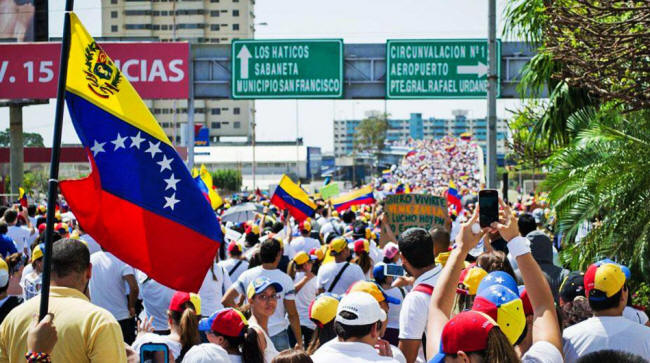|
from Strategic-Culture Website
Working through the lack
of options that the U.S. has in terms of regime-change in Venezuela,
should lead towards a higher degree of investor confidence in the
Bolivarian Republic.
Then we can see that U.S. has failed in the first two.
While the U.S. does appear on the rhetorical level to be willing to embargo the rest of planet earth, they would have to effectively do so in order to embargo Venezuela.
By promoting
globalization as a virtue, at the institutional level, and not
simply recognizing it with problems and all as an inherent component
of market economies, the U.S. has withered its own ability to
control other civilizations and states in the world's growing
multipolar system.
Because it is impossible to 'cut' China out of the global economy, it is impossible to cut Venezuela out as well.
Given how much China is
invested into Venezuela's economy, as
the Wall Street Journal notes,
there's little chance that will change either.
When we read
that Pompeo has explained that the Venezuelan opposition is
'divided', this is of course nothing other than good news for those
concerned with regional stability, economic development, and a
de-escalation of tensions that can lead towards war and instability.
Both the governments of
Brazil and Colombia - close U.S. allies under their present
administrations - have ruled out any sort of military intervention
into Venezuela.
This admission came on the heels of the recorded statement to the WP, where he previously explained:
He continued, saying that:
Subsequent to that comment, he would explain that an excess of 40 different Venezuelan opposition politicians have come forward expressing their view that as Guaidó is but a transitional figure, that they ought to be 'selected' by the U.S. to win an actual (i.e. staged) election.
This would be, ideally for them, an election that comes on the heels of an absolute restructuring of the security apparatus of Venezuela.
The idea would be to ensure the marginalization of the PSUV forces from the electoral process, a 'counter-revolution' of sorts. The staged elections involving various opposition parties and leaders would be an afterthought in all reality.
And still, there is no consensus among this opposition on who should lead.
Pompeo would continue to explain:
Pompeo expressed tremendous exasperation with this state of affairs, commenting that his realization of the problem isn't one that came about recently, but is one in fact he was aware of since he began his work in the Trump administration with the CIA.
To that point he stressed that these are problems which not only manifested themselves in,
That's to say, Pompeo understood this problem all along.
The whole project was
dead on arrival...
Yes, that leaves military options, nominally on the table in terms of U.S. pressure tactics and techniques. But the reality is that these are something much less tangible than the U.S. has historically relied upon. A lot of this has to do with the general decline of the U.S. military in comparative terms.
While the U.S. maintains something approximating its military capacity in absolute terms, compared to a decade or two ago, it has not managed to maintain that in relative or comparative terms.
The 'gap' between the
U.S. and other rising powers, military speaking - and this reflects
economic changes as well - has become smaller.
Even the Washington
Post, as well as other mainstream U.S. billionaire blogs, has
admitted as much.
These could potentially bring the number of downed U.S. fighters to many dozens in the first hours, of the first sortie.
The loss of prestige
alongside the scores of Cindy Sheehans this would produce,
makes the venture a non-starter from go.
But it failed to push it
over the edge, and its thanks to a growing and new international
consensus that this was the case.
We'll recall that Russia experienced similar, based in the same manipulation of oil prices, leading to a temporary 'shock' to the Ruble, which plummeted in value relative to the Dollar overnight, stoking a major crisis between June and December of 2014.
Russia was in a better
position to manage this, and though without hiccups, has managed to
avoid the sorts of repercussions that Venezuela has faced.
These work-around
measures by Venezuela can improve, but the distance between the
economic attacks from the U.S., and the operationalizing of Guaidó
in a coup gambit, was too great for the U.S. to use them in
combination in an effective way.
The science and art of
regime change has given rise to the science and art of the
counter-coup.
International help in
combating such state-sponsored terrorism, as
reported by Venezuelan
state news agency TeleSur has already been had, however, and so we
can expect that we will see how effective this has been through the
lack of much materializing in this direction.
Investor confidence and
the assurances to Spanish, and therefore by extension German,
banking interests operating without the U.S. as a middle-man in
Latin America, are well-founded and lead towards a bullish trend.
As far as Venezuela is
concerned, it's an excellent case study in sovereignty in the 21st
century, despite a west-centric socio-economic focus on
globalization...
|


